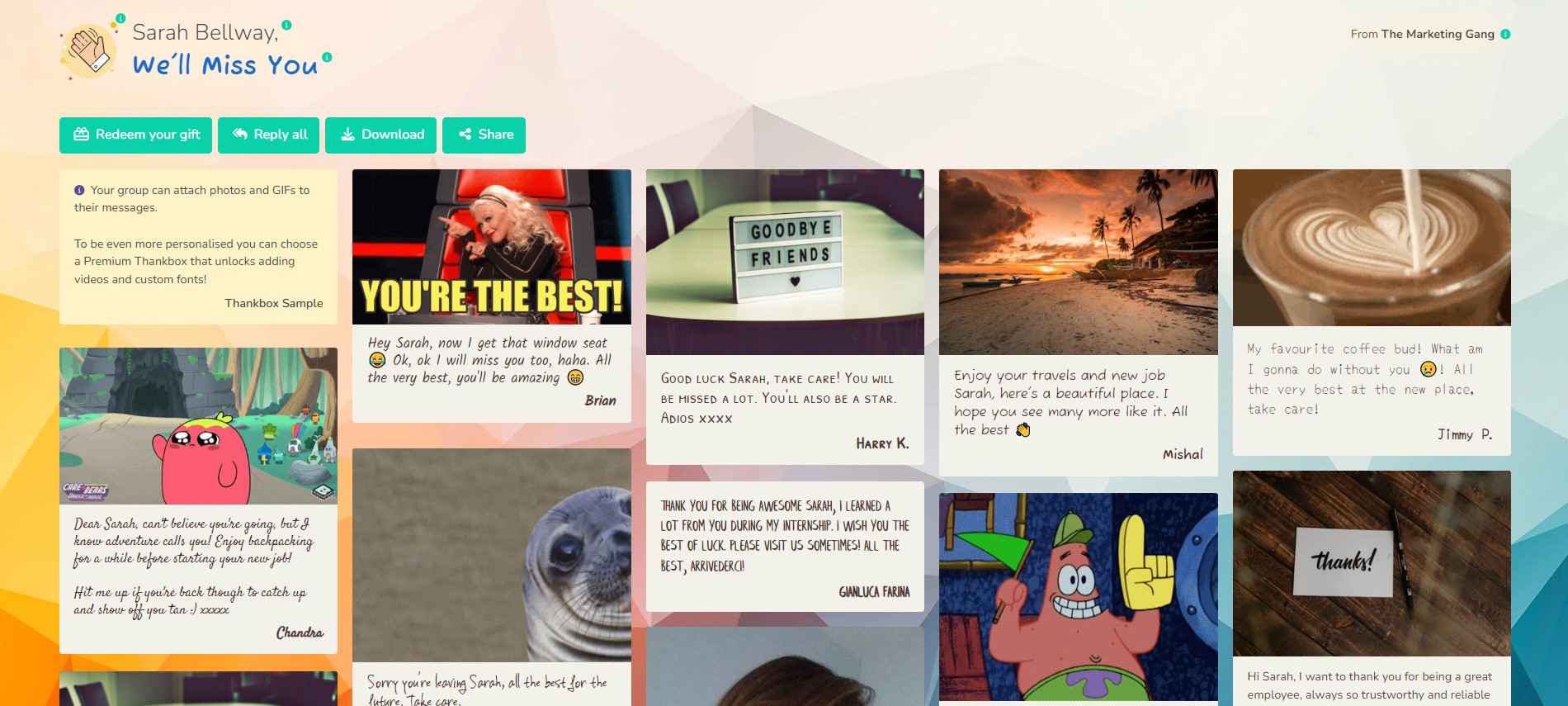We Share 15 Must-Ask Questions for Your Next Exit Interview


Let’s face it—saying goodbye to a coworker is never easy, especially if they bring the best biscuits! But before they walk out the door, there’s one way to turn their farewell into a learning opportunity—the exit interview.
An exit interview is your chance to sit down with them and have a candid conversation about their experiences with your company. Think of it as a feedback session that can improve employee retention and your workplace.
But to make this conversation impactful, you need to ask the right questions.
Here at Thankbox, we’ve compiled a list of must-ask questions for your next exit interview, designed to dig deep and uncover meaningful insights. Ready to turn a goodbye into constructive feedback?
Let’s get started!
What is an exit interview?
An exit interview is a conversation between an employer and an employee who’s leaving, typically taking place on their last day. The primary purpose is to gather honest feedback about their experience, from their initial onboarding to their final days.
Think of it as a two-way street—they get to share their thoughts on what worked well and what didn't, while you gain a clearer idea of your workplace. It’s a chance to uncover their reasons for leaving, job satisfaction, and more.
While negative feedback can be tough to hear, it’s crucial for identifying areas that need your attention—boosting workplace efficiency and continuous improvement.
Why are exit interviews important?
In addition to what we’ve already mentioned, let’s explore some other benefits of exit interviews—especially when practising active listening:
Identify areas for improvement: As you might guess, departing employees often feel more comfortable sharing honest feedback, highlighting unique areas that need improving.
Boosting work-life balance: Exit interviews reveal how employees really feel about their work-life balance, including remote work options and flexibility. You can use this information to better support your team in the future.
Support employee development: It can help you assess your onboarding and training procedures to ensure they encourage employee growth. This way, you’ll be able to create an employee development plan that inspires success.
Elevate company culture: Get insights into communication and behavioural factors that shape your company culture. After all, understanding these elements helps build a happier workplace.
As well as collecting feedback, exit interviews are a great opportunity to wrap things up on a high note.
Speaking of ending on a positive note—Thankbox online group leaving cards are the perfect way to say “Goodbye.”

With Thankbox, everyone can add their own personal touch, from heartfelt notes to funny stories. Simply send a link with our automatic invites—no matter where employees are in the world, and they can contribute messages, GIFs, photos, and even videos!
Want to give a going-away present? Thankbox makes it easy to add a gift collection pot. As colleagues write their messages, they can also chip in money—eliminating the hassle of hearing, “Do you have any change?” or the rattle of an overflowing envelope.
The recipient can use these contributions to choose from hundreds of digital gift cards worldwide. You can even send flowers—after all, who doesn’t love flowers?
The 15 best exit interview questions
Ready to dive into the must-ask questions for your next exit interview? Let’s break it down into categories:
Questions about the job role
Questions about career development
Questions about the work environment
Questions about management and leadership
General feedback and insights
Questions about the job role
1) Did you find your job description accurate?
Sometimes the job description doesn’t match the actual work. This question helps determine if their responsibilities matched what was described, helping you manage future employee expectations more effectively.
2) What did you enjoy most about your role?
It’s not all about the negatives. Highlighting what worked can help your company understand what aspects of the job are particularly appreciated—so you can do more of it!
3) What was the most challenging part of your job?
Challenges come with any nine-to-five, but identifying common pain points means you can address them proactively, making future roles more manageable and much less stressful.
4) How could your role be improved?
Helpful suggestions can lead to enhanced job satisfaction for your future hires—whether it’s additional resources, clearer responsibilities, or more support from management.
As you turn farewells into valuable insights, don’t forget to celebrate as a team! Create a Thankbox and make every goodbye a step towards a better workplace.
Questions about career development
5) Could you develop your career?
Did they have a perfect mentor? Did they have the resources to succeed? Understanding if their career development needs were met ensures future employees don’t face the same hurdles.

6) What suggestions do you have for career development programmes?
Employees know what works and what doesn’t—especially regarding their own progression. Use their input to tailor future programmes so they don’t fall into the same trap.
Questions about the work environment
7) How would you describe the work culture?
Knowing how employees perceive your workplace culture can be eye-opening. You’ll gain insights into what makes your office tick. After all, work culture plays a big role in any company.
8) Did you enjoy working with your coworkers?
Peer-to-peer recognition goes hand-in-hand with a healthy workplace. Thankfully, their answer shed light on team dynamics and any interpersonal issues. Plus, it helps you understand your team’s camaraderie levels.
9) Did you feel supported by your team?
It’s important to know if they received the necessary resources and support to perform their duties. Otherwise, productivity, job satisfaction, and staff morale will plummet.
10) How was the communication within your team?
You want to understand how well information flows within your team, this question reveals any communication barriers that may exist and need addressing.
Questions about management and leadership
11) How was your relationship with your direct manager?
Understanding their relationship reveals the strengths and weaknesses of your leadership team. If this is the case, check out our article, “Unveiling 10 Leadership Competencies: Your Guide to Success.”
12) Did management value your contributions?
As you know, feeling valued at work impacts performance. Here, you’ll discover areas where management could improve in recognising and supporting their team members.
General feedback and insights
13) What led to your decision to leave?
Here comes the big question. Asking why they decided to look elsewhere uncovers all the reasons behind their departure, from initial dissatisfaction to the final tipping point.
14) What are your overall thoughts on working at the company?
Although it’s a broad question, it invites the employee to share their general experience, giving you an in-depth view of what works and what doesn’t.

15) What suggestions do you have for improving the company?
Feedback is invaluable. Employees often hold practical ideas on improving company policies, culture, and operations. So listen to their thoughts and put them into action!
As you turn farewells into valuable insights, don’t forget to celebrate as a team! Create a Thankbox and make every goodbye a step towards a better workplace.
Wrapping up
Who better to provide feedback than someone who’s been right there in the thick of things? By asking the right questions, you can uncover valuable insights that help make your workplace even better.
At Thankbox, we believe in making goodbyes truly special. Send off your colleague with a personalised Thankbox filled with warm wishes and heartfelt messages—all in one place!
Create a Thankbox today and let them leave on a high note!
Images: Cover | Smiling redhead woman | Men working together at the office





